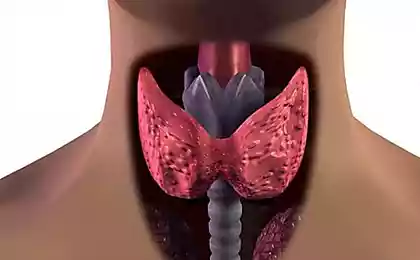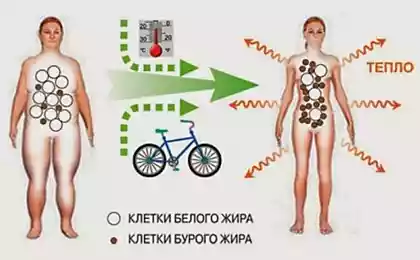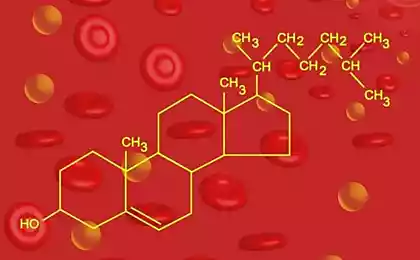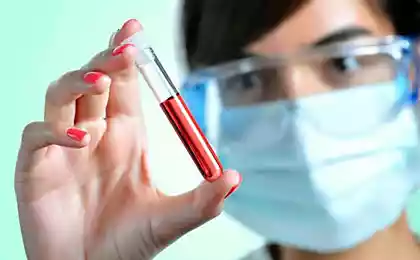494
The TRUTH about cholesterol
Now is the moment when the reader does finally tell the truth about the biochemistry, metabolism and functions of cholesterol.
Cholesterol is often confused with fats. Unlike fat, cholesterol is not usedby the body to obtain calories and has no relation to obesity or to the cellulite (cellulite is pure myth, invented by cosmetologists, but it deserves a separate discussion).
Cholesterol – fat-like organic substance from the group of sterols of animal origin. Its molecular formula – 27 N 46 About. From the chemical point of view, this unsaturated alcohol.
Cholesterol has a complex heterocyclic steroid nucleus. The carbon skeleton of cholesterol consists of four rings: three rings contain 6 carbon atoms and one or 5 atoms. It departs from the long side chain (figure below). Molecules of cholesterol are hydrophobic.
A characteristic chemical property – the ability to form molecular complexes with many salts, acids, amines, proteins etc. Most cholesterol in animal tissues is present in the form of esters of fatty acids.
By the way:
In plants there is no cholesterol – no and no kaki, that's why the inscription on the bottle of vegetable oil contains no cholesterol" – very true. In plants, there are other sterols, known as phytosterols, molecular structure similar to steroid hormones. They are often added in cosmetics is prohibited for this purpose human hormones. Whether they act on the skin or only the mood of consumers is also a topic for another article.
We speak of "cholesterol" – mean "atherosclerosis". We say "atherosclerosis" – mean "cholesterol". And is it true? In fact, the cholesterol would have to rank at least the vitamins! The normal functioning of a number of vital systems of the human body is not possible without cholesterol.
Cholesterol is absolutely essential as a building material for cell membranes during cell division. It is especially important for a growing child's body. Not one cell in our body cannot do without it, as cholesterol frame" is the basis of cell membranes, regulates their permeability and activity of membrane enzymes.
The amount of cholesterol in the membrane to a certain extent depends on the strength of the cell, its ability to survive. It protects intracellular structures against the destructive action of free oxygen radicals that are formed during metabolism and under the influence of external factors.
Breast milk is rich in cholesterol. Infants and growing children need fat-rich and cholesterol products, including the full development of the brain and nervous system.
According to the data of radionuclide studies in the human body contains up to 350 grams of this substance: 90% in the tissues and 10% in the blood. About 20% of the total amount of cholesterol contained in the brain and spinal cord – it is a structural component of the myelin "insulation" of the nerves. In plasma it is in the form of esters with higher fatty acids and serves as a carrier during their transport.
In the liver from cholesterol synthesized bile acids arenecessary for emulsification and absorption of fats in the small intestine. For this purpose goes 60-80% of the daily formed in the body of cholesterol.
Cholesterol is the "raw material" for the production of steroid hormones of the adrenal cortex (hydrocortisone and aldosterone), and both male and female sex hormones (estrogens and androgens). In men, the obsession with cholesterol-free foods can be dangerous for sexual activity, and women, very active in the fight against cholesterol, amenorrhea often occurs. Especially pointless adherence to a cholesterol diet of women of childbearing age, since menopause female sex hormones just do not allow the cholesterol to be deposited on the walls of blood vessels.
Cholesterol – a fat-soluble precursor of vitamin D, necessary for calcium metabolism. This is especially important for bone, nervous system, insulin production, maintain muscle tone, mineral metabolism, the immune system and for normal growth and development of the child.
By the way:
Vitamin D is formed in the skin by action of ultraviolet light. Its content in the food (even in such as fish liver, fatty fish, caviar, eggs, milk fat) small. Hypovitaminosis D threatens miners, explorers and young children. Breastfed infants vitamin D deficiency is very common and leads to the development of rickets.
The daily adult requirement of this vitamin is uncertain. The inhabitants of the far North in the polar night and babies in the winter to sunbathe under the ultraviolet lamp, and if it is not possible to take vitamin drops or tablets – as long as the doctor ordered: hypervitaminosis D – an unpleasant thing.
Cholesterol is required for normal activity of serotonin receptors in the brain.
Serotonin – a substance responsible for good mood. Low cholesterol is associated with depression, aggressive behavior and tendency to suicide. Particularly acute is manifested in the elderly.
Elderly people with low cholesterol melancholy three times more often than their peers who have a cholesterol. Recently the American scientists have proved that those people who have managed every conceivable way to lower cholesterol, are more likely to have an accident resulting in death, committed suicide, become victims of violence.
Chemical signal by which glial cells of the brain induce neurons to form new synapses appeared to be cholesterol. Researchers from Boston University have shown that a decrease in the content of cholesterol in the blood may reduce intellectual abilities. (Neuroglia, from GK. neuron – a vein, nerve and glia – glue the cells in the brain and spinal cord, filling the space between neurons and brain capillaries. Serve to protect and support neurons, provides reactive properties of nervous tissue – scarring, participation in reactions, inflammation, etc.)
As shown by the results obtained by scientists from Harvard University, a high content of cholesterol associated with a "good" high-density lipoproteins (HDL), by 30-40% reduces the risk of developing Alzheimer's compared to people of the same age group with average cholesterol levels. A lipoprotein is a complex of proteins (proteins), molecules which include fats (lipids) and what is "good" and "bad" lipoproteins, we will examine below.
Since cholesterol is so important for normal functioning of the body, entering it with food (exogenous cholesterol) is complemented by synthesis in cells of almost all organs and tissues (endogenous cholesterol).
Especially a lot of it is produced by the liver (80%), in the wall of the small intestine (10%) and skin (5%). Measurements and calculations show that only one third of the necessary cholesterol our body gets from food, and two-thirds are produced by the cells of the body. Daily in the human body is synthesized from 0.7 to 1 g of cholesterol, two times more than the approximately 0.3-0.5 g, which come from food.
A relatively small excess or deficiency of cholesterol in the diet, the body compensates for the change of the synthesis of cholesterol. About the consequences of a significant shortage we have already said. But the damage is moderately excessive and even normal receipt of cholesterol with food is highly exaggerated. But to prove it, you need to understand what happens to the cholesterol in the body.published
P. S. And remember, only by changing their consumption — together we change the world! ©
Join us in Facebook , Vkontakte, Odnoklassniki
Source: cbio.ru/page/47/id/2127/























